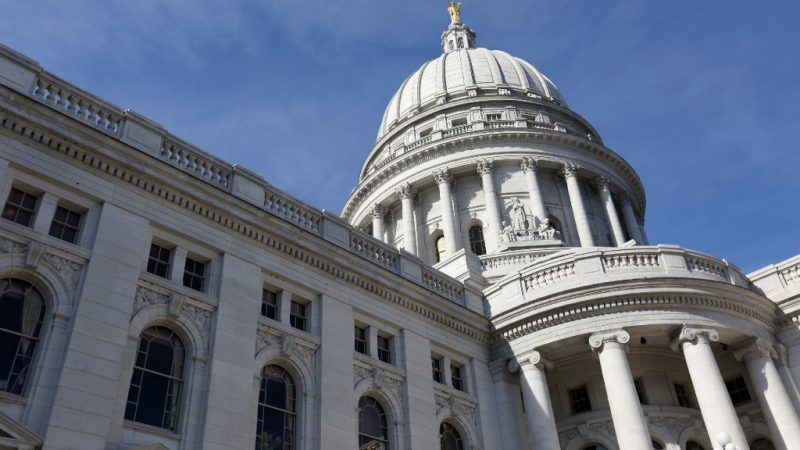Gov. Tony Evers is asking for more than $800 million to address the COVID-19 pandemic in a sweeping bill that would also halt enforcement of voter ID, ban evictions, and prevent the layoffs of school employees during a public health emergency.
The proposal, which the Evers administration released late Saturday, also would give the Department of Health Services unlimited spending and position authority during a public health emergency.
GOP legislative leaders indicated in a letter earlier Saturday the “current general fund
balance can’t support” the proposal.
They also urged the Evers administration to move quickly to use the state’s share of an estimated $2.3 billion coming to Wisconsin as part of the federal relief package to buy needed personal protection equipment.
>> WisPolitics is now on the State Affairs network. Get custom keyword notifications, bill tracking and all WisPolitics content. Get the app or access via desktop.
The proposal also calls for a host of provisions to address the impact on state residents amid a ban on nonessential travel and an order that has forced many businesses to close.
Along with suspending the voter ID requirement during a public health emergency, the bill calls for allowing voting by mail and a longer window to register online. The bill also calls for pushing back the deadline for receipt of an absentee ballot. It would have to be postmarked by Election Day rather than received by 8 p.m. on Election Day as currently required.
The bill also would allow the Department of Administration to print absentee ballots for local governments.
The biggest pieces of the package include: up to $300 million for the Department of Military Affairs; up to $200 million for the Department of Administration; $100 million to expand programs for the working poor; and $100 million in grants to health care providers.
The package also would provide local governments with a 1 percent increase in aids for 2020, a boost of about $7.5 million.
Other provisions would:
*require school boards, independent charter schools and private schools in the state’s choice program to continue paying employees their normal salaries while schools are closed by DHS order. Those schools also would be prohibited from laying off employees during a public health emergency.
*delete the one-week waiting period before someone who applies for unemployment can begin collecting checks.
*relieve the Department of Public Instruction from publishing a school and school district accountability report for the 2019-20 school year.
*prohibit insurers from canceling policies due to nonpayment of premiums during a public health emergency.
Several provisions are similar to executive orders Evers has already issued.
He suspended evictions this week, and the bill calls for banning landlords from moving to evict tenants for nonpayment during a public health emergency and the 45 days after it’s over.
The guv also has moved to make it easier for health care professionals to practice in Wisconsin during the pandemic. One provision in the bill would allow former health care providers to get a temporary credential to provide services for which they have been previously licensed or certified.
The administration is also seeking a joint resolution that would indefinitely extend the public health emergency Evers issued March 12 in response to the pandemic. Under the proposal, the extension would last until it was revoked by a subsequent executive order or a joint resolution.
The Evers administration released the bill drafts as well as correspondence with state lawmakers. This came after Senate Majority Leader Scott Fitzgerald, R-Juneau, and Assembly Speaker Robin Vos, R-Rochester, earlier today made public a letter urging Evers to move more quickly in securing personal protection equipment. The pair suggested the guv’s staff had delayed trying to procure the equipment.
They also pointed to a Legislative Fiscal Bureau memo that laid out the expected money the state will receive from the package signed into law Friday. Wisconsin is in line to receive nearly $2.3 billion, including $1.9 billion directly to the state. According to LFB, there is no legislative oversight for that money.
They argued the Evers administration has the ability to buy the protection equipment now — before the federal money comes in — to cover the costs.
“Again, we implore you. Please do not wait any longer to buy ventilators and masks. Do it now,” they wrote.
The Evers administration fired back late Saturday with a rundown of the equipment it has procured so far:
*the purchase of nearly $7.5 million in medical and public health supplies. The administration said it is pursuing another $400 million in supplies, personnel and facilities.
*as of Thursday, the receipt of about 104,680 N95 respirators, 260,840 face/surgical masks, 48,168 face shields, 40,512 surgical gowns, 192 coveralls, and 70,375 pairs of gloves from the Strategic National Stockpile.
*efforts to secure needed supplies after FEMA informed the state that its request had been moved down the priority list.
Evers Chief of Staff Maggie Gau wrote Fitzgerald, Vos and their aides late Saturday to express her disappointment that “instead of working together to address COVID-19 in Wisconsin, it seems you are more interested in having political squabbles.” She dinged the legislative leaders for not personally participating in the daily briefings offered by the administration and wrote the administration has been actively working to acquire the needed supplies.
“We simply will not wait for the Wisconsin Legislature or the Trump administration to act. Too many Wisconsin lives are at stake,” Gau wrote.
According to the LFB memo on the federal stimulus, three communities are in line to receive $360.6 million of the coming stimulus money. The bill puts aside money for communities with populations of at least 500,000 to receive a direct payment from the feds. That means Milwaukee County is in line for $164.5 million, Milwaukee for $102.7 million and Dane County for $93.4 million.
Read the bill.
Read the overview of the legislation.
Read the resolution.
Read the LFB memo on the federal stimulus.
Read the letter from Fitzgerald and Vos.
Read Gau’s response.


